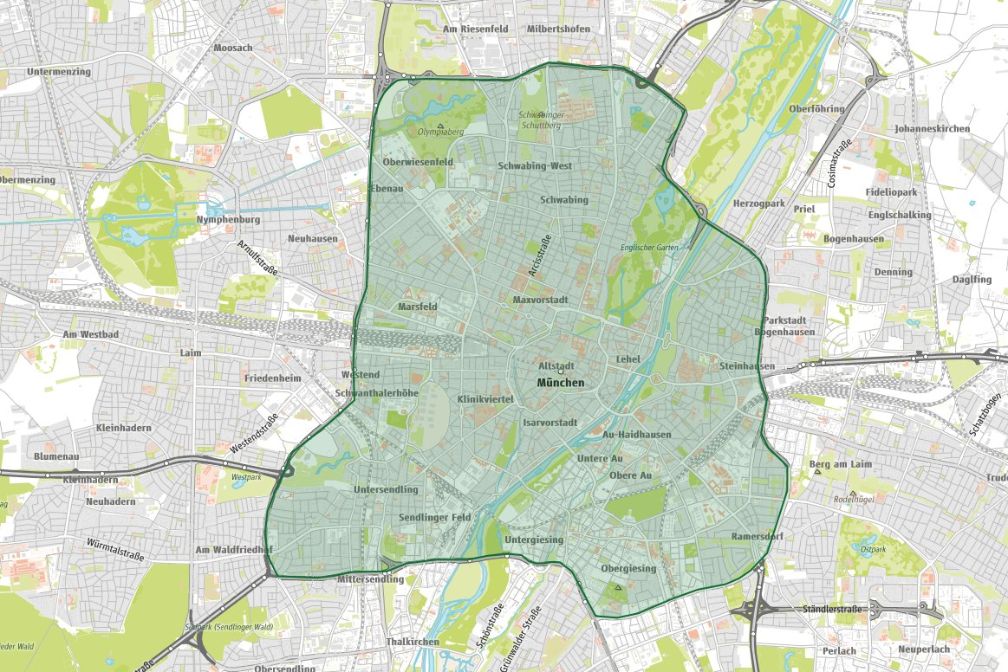Thessaloniki gets ready for its metro launch in November
The underground rapid transit lines have been under construction for almost two decades due to various project delays
 TheMayor.EU logo
TheMayor.EU logo Local authorities will launch a low-pollution zone covering a large part of the city
As of 1 February, Munich plans to ban polluting diesel vehicles from entering a huge area in the centre of the city as part of the local authorities' bid to curb pollution. The ban, however, is only the first step in a system of restrictions the city plans to implement if pollution levels stay high.
The system has built-in exceptions and deadlines for pollution drops, making it a piece of policy that functions like clockwork. This almost machine-like policy cuts out all the politicking associated with introducing unpopular policies and boils down the subject to its core elements – are harmful nitrous dioxide levels too high or not?
The aim of the plan is to comply with the nitrogen dioxide limit, which has been in force since 2010, as fast as possible. The ban will affect cars that are below the diesel EURO 5/V emissions category and is made up of three steps with progressing severity.
The ban will be introduced in three stages for diesel vehicles EURO 5/V and worse. Each subsequent stage would come into force if the nitrogen dioxide cap cannot be met.
 The low-emissions zone in Munich, Source: City of Munich
The low-emissions zone in Munich, Source: City of Munich
Stage 1 set to come into effect on 1 February will apply to diesel vehicles with the emission standards Euro 4/IV and worse in the environmental zone. Delivery traffic and residents are excluded from the diesel car ban. Furthermore, craftsmen, shift workers, people with disabilities and emergency services are also exempt from the ban.
If the city still cannot meet its nitrogen cap, stage 2 will kick in on 1 October 2023. In stage two, the threshold will be raised to diesel vehicles with an emissions standard of EURO 5/V or worse, while all exceptions from stage 1 would still apply.
If that does not curb nitrogen dioxide, stage 3 will take effect on 1 April 2024. Here, the bar on vehicles will not raise, instead, residents and delivery traffic with diesel vehicles below EURO 5/V would be banned in the zone.
On the other hand, the exceptions for craftsmen, people with disabilities and emergency services would remain in force indefinitely.

The underground rapid transit lines have been under construction for almost two decades due to various project delays

Now you can get your wine in Talence by paying directly in Bitcoin

That’s because the state has to spend money on updating the railway infrastructure rather than subsidizing the cost of the popular pass

Rethinking renewable energy sources for the urban landscape

The examples, compiled by Beyond Fossil Fuels, can inform and inspire communities and entrepreneurs that still feel trepidation at the prospect of energy transition

Now you can get your wine in Talence by paying directly in Bitcoin

The 10th European Conference on Sustainable Cities and Towns (ESCT) sets the stage for stronger cooperation between the EU, national and local level to fast track Europe's transition to climate neutrality.

At least, that’s the promise made by the mayor of Paris, Anne Hidalgo

The underground rapid transit lines have been under construction for almost two decades due to various project delays

At least, that’s the promise made by the mayor of Paris, Anne Hidalgo

Hostal de Pinós is located in the geographical centre of the autonomous region

Despite its church-y name, the district has long been known as the hangout spot for the artsy crowds

Urban dwellers across the EU are having a say in making their surroundings friendlier to people and the environment.

Forests in the EU can help green the European construction industry and bolster a continent-wide push for architectural improvements.

Apply by 10 November and do your part for the transformation of European public spaces

An interview with the Mayor of a Polish city that seeks to reinvent itself

An interview with the newly elected ICLEI President and Mayor of Malmö

A conversation with the Mayor of Lisbon about the spirit and dimensions of innovation present in the Portuguese capital














